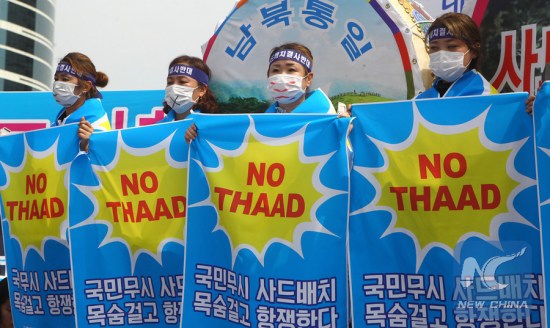
People from Seongju county hold banners to protest against the deployment of the Terminal High Altitude Area Defense (THAAD), during a rally in Seoul, capital of South Korea, on July 21, 2016. (Xinhua/Yao Qilin)
The controversial deployment of the Terminal High Altitude Area Defense (THAAD) system on the Korean Peninsula yet again betrayed Washington's deep-rooted Cold War mentality and its petty anxiety over the United States' declining global hegemony.
The Republic of Korea (ROK) last month announced plans for a U.S.-made THAAD battery to be deployed in Seongju County, 300 km southeast of Seoul, by the end of next year.
Washington claims that THAAD can help defend the ROK against potential security threats from its neighbor, the Democratic People's Republic of Korea (DPRK).
But as the missile shield is designed to intercept incoming inter-continental ballistic missiles at relatively high altitudes, the DPRK needs only short-range rockets and conventional arms to launch attacks on its southern neighbor.
This alone renders THAAD a completely ineffective deterrent, and suggest that there is a hidden agenda behind THAAD, an installation that barely covers Seoul but extends its reach to China and Russia's Far East.
With its X band radar commanding surveillance of an area that extends over 1,200 miles from the peninsula, THAAD can be used to collect radar data of warheads and decoys of Chinese and Russian strategic missiles by monitoring their tests, thus enabling the United States to neutralize their nuclear deterrence and put the national security of China and Russia at risk.
After years of trumpeting the fictional "China threat," Washington is now bringing real, strategic threats to China's doorstep.
Deploying THAAD in the ROK to counter the so-called "missile threat" from a "rogue state" is yet another Hollywood-style drama directed by and starring Uncle Sam as part of the United States' Pivot-to-Asia strategy.
What lies behind the scheme is Washington's insatiable appetite for global hegemony and its vain anxiety toward an imaginary enemy from a rising China.
Such anxiety is both economically and militarily motivated from the U.S. side.
Last week's lower-than-expected U.S. GDP data in the second quarter of 2016 continued to point to a significant loss of momentum that puts the economy at risk of stalling in a country that has seen growing anti-free trade sentiments.
More pertinently, it is the United States' declining military supremacy that constitutes the main driver behind its THAAD muscle flexing.
Deploying THAAD in the ROK is a crucial step to healing the Achilles heel of Washington's anti-missile missile system in the Asia Pacific, which has long been nagged by its inadequate recognition ability.
With the help of THAAD's X band radar, the United States can effectively and immediately raise recognition accuracy.
But this strategic upper hand comes at the cost of the security interests of other nations in northeast Asia.
Already, the DPRK has threatened to take "physical countermeasures" to deal with THAAD, which Pyongyang says would only exacerbate tension in the region, encourage a new arms race and even provoke another Cold War.
Chinese Foreign Ministry spokesperson Lu Kang also warned last month that China will take necessary measures to safeguard its own interests if the United States and ROK don't stop the deployment.
The United States is highly advised to stop building its own security at the cost of the security of other countries. The nearsighted actions will only destabilize the strategic balance and stability in northeast Asia, giving Washington more things to worry about.


















































